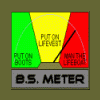Leaderboard
Popular Content
Showing content with the highest reputation on 04/12/2011 in Posts
-
OK, since your clearly not going too show us you're boobs, I'll answer your question. The problem with going straight to medic school is the educational system is not set up for it. Let me explain. When you leave EMT school, you are expected to be `barely competent``. It is expected that you will be heading out to the world to gain experience and get comfortable with the following skills: History taking Touching people Talking too people Dealing with vomit/blood/urine/feces "out of the box" (or what we call "critical") thinking Because these skills are expected to be obtained through experience (not on your practicum as there is not enough time). They are an unwritten prerequisite for Paramedic school. That is the real problem, Paramedic schools are not designed to facilitate basic human interaction skills, those are expected to be there when you start. So my REAL answer is, it is individual based. If you have worked customer service or interacted with the public on a personal level in the past then you may already have those skills. So my suggestion would be to go start school. However, if you are like 90% of the students I have gotten lately, and have locked yourself in the basement for the last 10 yrs playing videogames and depriving yourself of public interaction, then chances are you have no human interaction skills and need to get out there to develop them. Paramedic practicum is not the place to develop those as your preceptor will fail you, and working as a medic is also a poor time too find out you are uncomfortable being in "personal" space. But whatever you choose don't ever let anyone convince you that you need to master EMT skills prior to entering Medic school. You only have to master life skills.2 points
-
Yeah, this decision really isn't all about money for me, and there is no cut and dried answer in a merit based world. Why would I give up shifts when others are stuck at home? Because I'm a Christian and that's what 'we' do? No, I am not a follower of Christianity. Because I think, just in general that it's a nice thing to do? Not really...but kind of.. Because I want those folks to owe me a favor? Nah... It's not about money, but about positive energy for me. (I'm afraid I may be about to lose any small measure of respect I may have gained here...but this is my perspective..so there you have it.) I truly love being a husband and a father. I think that I do about a half assed decent job at both..but it's not always been that way. I spent much of my life angry and bitter. That was bad for me and everyone around me...Since I've grown up I've decided not to live that way any more. I laugh a lot, love even more, and try and do what keeps me strong and healthy and 'good' for my family. Working my second shift while someone else goes without would not only make me feel like a shithead, but would also poison the environment that I have to spend so much time in. See? I would maybe succeed financially, but would then have to live in the environment of those that are not doing so. Some by their own design, others because they simply don't know better. Making the single minded decision to care for me while ignoring my team means that I have to spend my days in that poisoned (unhappy) environment, and I just simply won't do that any more. I love the safety and security that comes from being part of a really good team. When I was overseas I did, I believe, some really good medicine. But it was easier there because there was a core group of people that watched out for each other. I never gave a moments thought to falling on my face...because my team would have never allowed that, the same that I would not have allowed it for them. A single minded 'me' focus disallows that environment to form and flourish. Any medic that's every been on an Oh Shit call with a bunch of people that they knew and had worked well with before knows exactly what I'm talking about. Will I risk my families financial health to help others? I depends on the size of the risk and who the 'others' are. Will I change my shift so that the drunk, single, shithead can get more hours? No...he's got hard lessons to lean yet and I'm not going to act as his buffer, preventing him from learning them. Will I change to help the single mom so that she doesn't need another job at a different service? Yeah, if she's a good person, and I'm able, I would love to do that. That is good 'juju' in my world. Makes me feel good, makes my days better. So for me this isn't a strictly financial decision. It's more based on good energy, and staying in the good energy seems to keep me in a place where I rarely, if ever, am concerned about my financial health. So giving up my shift, though it may sound generous, is really still a selfish, as it's still my attempt to try and build a world to live in that is good for me, and Babs, and Dylan. Ok, enough of the bullshit Yoda stuff...but it's my thought on the subject so thought I'd throw it out. Dwayne2 points
-
Right is always right is too simplistic. What is right for the person may not be right for the company, what is right for the company may not be right for an employee. What is right for my family may not be right for your family. Does it make it WRONG? No. Does it make it less right? Depends on the person or outcome. While I may have a full time job, I may still need the extra job to support my family. While I understand your needs, for me my family and their needs have to come first. It would have been honorable for people to step down, but it's not about what others can do to make your life easier, it's about what they can do to support themselves. If I didn't need an "extra" job, I wouldn't have one. For your right is right senario: Lets say I give up my "extra" job which means I make less money. Now I have to chose between electric, rent or food. Sure you have your job, but because I had to work 2 jobs to make ends meet, I've lost my place to live. Would it still have been right for me to give up my hours? Yeah it sucks, and I'd be a little pissed if I were in your shoes too, but sometimes circumstances aren't what they seem. -MetalMedic2 points
-
If there are EMT's and Medics choosing to work double time and make sacrifices to the amount of time they have off the job, they should be punished by having to work less desireable shifts because of their own initiative? It just doesn't sound like logical thinking. The management is out of line to ask you to make a hard decision that they are paid to make. To give up something you have worked hard and long for to benefit someone who has not, seems a little to socialist for my liking. Just my thoughts. Fireman10371 point
-
Lets not fool ourselves here... This specific scenario never actually occured. Its purely a construct of crotchity's imagination, designed to showcase the superiority of his moral position. Its a lecture, not a discussion.1 point
-
While not my original question, your statement encouraged me to do some research...so I'm learning today which is never a bad thing. Since I was under the impression that chloraprep was used for things such as blood cultures and not for simple IV or even SC/IM injections, I had to do a little reading. Based on this site, http://www.chloraprep.com/, it reads that a chloraprep (which containes a 2% Chlorhexidine Gluconate/70% Isopropyl Alcohol formulation) "requires two minutes to begin antimicrobial activity". So, for every IV that you start, you wait two minutes? If so, can I assume you are cleaning the site prior to applying the constricting band?1 point
-
I think the answer depends a lot on your self, and how long you take to get comfortable with your skills. Personally, I will have been an EMT for 2 years before I start medic school in the fall. By comfortable I don't just mean knowing your skills, I mean being confident in yourself that you can handle a call and be in charge of everyone else on scene. I found a great volunteer place to start out with where I volunteered doing actual shifts (vs on call) w/ great people who were very experienced in EMS. I then moved and got a paid job at a different company. In both places I worked with medics, so in addition to using my BLS skills (both running BLS calls and assists on ALS calls) I got to see ALS calls being run, and ask questions of my partners afterwards. This exposure to ALS has helped me learn a lot more then what I simply learned in basic school, and is giving me a good foot up for medic school (I hope!). Also, when I started as an EMT, I was very nervous on calls and interacting with patients, now that is second nature, and one less thing I will need to worry about figuring out how to do when I am figuring out how to be a medic. As someone (I think Dwane?) said, if you are going to be an EMT first, it is important to look at the place you plan on getting the experience to make sure it is the kind of base you will be wanting to build upon.1 point
-
Welcome to the job, MetalMedic You have a great question that nearly every new EMT who wants to be a paramedic struggles with for a while. . . I personally believe that having time to build road skills prior to attaching a -P is not only helpful, but vital. . . Getting into the feel of the job before having the full weight of responsibility for each and every call you're on as a paramedic is very important. . . It's not that the job is necessarily hard, but there are a lot of elements to the job, and if you don't have a solid background in basic skills on the bus and in BLS patient interaction, you will be a woefully lacking ALS practitioner. . . There will be times in your career where no level of advanced skills can save a situation, and having the stability of nerve and mind that comes with time will be your only salvation. . . It is a huge thing to be the paramedic on a call, since as the highest qualified practitioner, you are not only in control, but responsible for the outcome, and having some time under your belt to build the necessary fortitudes before being the one everyone else will depend on is absolutely invaluable. . . I personally spent 2 years as a -B grunt before entering the -P class, and it was the best thing I could have done. . . I feel that not only were my BLS skills second nature, but the essentials of patient interaction were honed and I was a much more patient oriented medic when I graduated with my -P. . . I was also able to develop firm nerves and an ability to calmly remove emotion and control a situation, which came in very helpful when I entered TEMS. . . There are a lot of good medics out there that know their -P skills back and forth but are unable to connect with their patients and use the 6th sense that solid, focused time in BLS can foster, because they have been just skills medics from the get-go. . . As much fun as having advanced skills is, the job is less about the skills, more about the person with the skills, and ultimately about the patient. . . If you are so busy practicing didactic knowledge and lab skills, you're going to miss the information the patient isn't telling you that a little time in BLS will teach you to read and intuitively feel. . . I feel that if your goal is paramedic, the "ladder" approach of going B-I-CC-P could be a waste of time and money, and will likely do little more than frustrate you as you spend years between stages when you could just be where you want to be. I'm not sure where you are, but in Upstate NY where I took my -P course, they offered an advanced paramedic program that was basically between standard -P and PA. . . It takes about 5 months longer, but you're much more skilled on the other side, and it's definitely worth the time, and you'll have more road time to acclimate to the job before operating as a -P. . . If you're aching to get going with the schooling, I might suggest enrolling in an Emergency Services Management course, which is offered by many schools that offer -P courses. That will give you 2 years of school time to run BLS calls while in school, and on the other side you'll have an AAS (some have 2 year BS degrees) and your -P, and should you decide to go into a regional or federal EMA, a degree in ESM will be invaluable. Just a thought. Good luck to you!1 point
-
Ok, here's the 'real deal'.... You've taken the NREMT and for whatever reason, you didn't pass it. This isn't the end of the world... What matters now is what your next step is. As I see it, you can do one of two things: 1. Sit back and lament about what a 'failure' you are and never put forth any effort on anything ever again (We don't want to set ourselves up to fail again, now do we?) 2. You can pick yourself up, dust yourself off and get back in the game. I'm going to echo armymedic here; many people have failed the test and still ended up being some really 'ace' providers. You've heard the age old saying that 'SH*t happens'? Guess what? This is just a pile of sh*t that you've stepped in. Time to scrape off the bottom of your boot, and keep on truckin! Most people that have trouble with the NREMT tend to overanalyze the questions, or worry about which number the test stopped on. The questions are designed to measure your cognitive skills, (how well you think about the scenario they present). They will give you all the information you need to 'solve it'...Do NOT start trying to 'guess' what they're getting at. The questions are straight-forward. Do NOT worry about your time (you'll have plenty of time if you stick to the task at hand and keep your head in the game). Don't worry about what question the test is on. This is NOT an indicator of how well you're doing/not doing! Take your time, (Remember the hare and the tortise? 'slow and steady wins the race'). Don't try to 'cram' the night before the next testing date, this will only get everything all twisted in your head. Get a good night's rest the night before. Eat a light snack before you go, and do NOT load up on water or other beverages, the need to pee is a bitch of a distraction! It's all up to you now....whatcha gonna do? If you have any questions, I'm sure that there are MANY people here that will guide you to the right answers. There's a wealth of knowledge here; take advantage of it! No one's here to bust your chops, we've all 'been there, done that', and some of us have 'been there, done that' so many times that we've designed the t-shirts you can get at the gift shop! Let us know how you plan to handle it, and how it turns out. Best of luck! LS1 point
-
I agree with armymedic571. Sometimes, it's just over analyzing the questions. Don't read in to them...read them as they are written. Look at the answer and read ALL answers before deciding which is the correct one. If it doesn't jump out at you, the play the elimination game. Eliminate the ones that really don't belong, and that is usually 2. Then, reread the question and look at the last remaining answers. With the basic test, you really do want to step through the ABCs. I took my basic and felt like too many of my answers were "airway" when, in fact, that is all they were looking for. As to whether or not you should take the NR...go for it. You never know when you might want to leave your state and the NR will transfer nicely to most other states...especially Texas. Good luck on that retest.1 point
-
As I recall it, NREMT-P exam was the easiest I've ever taken and passed. The hardest exam I've ever taken was administered by North Shore LIJ hospital for their job interview. Cheer up, it will get a lot harder and humbling down the road, so pick yourself up now and try again.-1 points
-
Obviously English is not your first language. Haitian is a national origin, not a race. Your racist assumptions have no place in this forum, so STFU.-1 points










